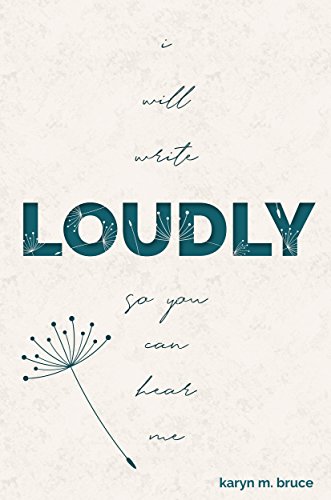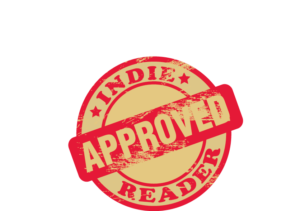I Will Write Loudly So You Can Hear Me received a 4+ star review, making it an IndieReader Approved title.
Following find an interview with author Karyn M. Bruce.
What is the name of the book and when was it published?
I Will Write Loudly So You Can Hear Me was published in April, 2018
What is the books first line?
“Watching you in this place of tears”
What’s the book about?
I Will Write Loudly So You Can Hear Me is the poignant and bittersweet account of a little girl’s memories of growing up as an only child with alcoholic parents. It is a book of sorrow and joy; a book of struggle and accomplishment; and, it is a book about life and death, where the author grinds the big ideas into little things.
What inspired you to write the book?
For the younger and earlier adult years of my life, I wrote and was taught to write about abstract ideas, things “out there” in the world around me. I took classes and learned about other authors. I never wrote about myself (I was told that wasn’t acceptable because the audience cannot relate), until I was taking a class concerning Robert Bly’s leaping poetry. I wrote a poem about the nine days of my mother’s dying (when I was 21) and burial. I didn’t write another personal poem for 30 years, when I was taking an online class. Something snapped inside of me. The fears of revealing the “secrets” of my childhood and my parents’ alcoholism were taken away. The more I wrote, the more I realized I wanted to somehow reach out to the children of the 40s who suffered in silence like I had done. And, that led to creation and publication of my book.
What’s the main reason someone should really read this book?
When I started giving book readings in local libraries, I was afraid that I would hear “you shouldn’t be discussing this” or “how could you write about your parents and put it out there in public?” What happened, however, was that while I read, I saw people crying. I wasn’t exactly sure why they were crying, but it was such a jolt to my soul I could hardly read. Then I heard what I didn’t expect: they, too, had had an abusive childhood; they, too, could never tell anyone, not even another relative; they, too, still had the scars. It was the woman who stood up during one such reading that made me realize the healing power of my book: She told the group her story, similar to mine, about her abusive father who put her in the emergency room of several hospitals. One doctor asked her how she broke her arm while her mother stood behind him and did the “I’ll cut your throat” motion with her hand. So she had to lie. It wasn’t the story that made me realize what my book had done for her. It was the statement she said at the end: “I have never told anyone about the abuse. My husband doesn’t even know.” She, too, grew up in the 40s and 50s, meaning for 60 some years, she kept that secret, and suffered, like I did, thinking it was only happening to her. In sharing my suffering, in telling my story, I give the reader the opportunity to realize he or she is not alone with theirs.
When did you first decide to become an author?
I decided to become an author when I realized I had a writing talent. I was accepted into Bowling Green State University’s BFA Creative Writing program, and my goal was to be a poet and then be a poet-in-the-schools, something I had done as an internship in Bowling Green, Ohio.
Is this the first book you’ve written?
This really isn’t my first published book. I wrote a children’s book back in the 1980s, but unfortunately, I only have one copy left. I published it myself, through a self-employed “publisher.” But, back then, there wasn’t an internet, so I placed my book into any store that would take it.
What do you do for work when you’re not writing?
When I’m not writing, I teach English as an adjunct professor at Johnson & Wales University in North Miami, FL. I also spend time with my granddaughter, two cocker spaniels, and my husband. I crochet, read, walk, and keep in touch with my friends. During this pandemic of COVID19, I have been able to do almost all of that, for which I am grateful.
What’s the best and the hardest part of being an indie?
When I was growing up, and then later into my college years, the only way to be published was with “real” publishers who “discovered” writers. I don’t know exactly how all that happened, but today those “real” publishers often publish what comes through contests. I entered those, and then waited the six months to receive word….that my book had not been chosen. It’s ok to do that when we are young, but I am not, and waiting each series of six months was not something I wanted to spend my life doing. I made the decision to use CreateSpace, and I have not been sorry. I had independence in the cover, the format, the poems I wanted to use. I picked my own artist. But not only did my book end up looking the way I wanted it to, I was opening the door to a million other possibilities. It is true, that because CreateSpace is an Amazon management, I could not get my book into Indie bookstores (and I had a list of every one in the country—and no luck). My belief is this: everything happens for a reason.
What’s a great piece of advice that you can share with fellow indie authors?
One day I was browsing through the internet, and I came across IndieReader. Then I found several others Indie companies. Then I contacted a few of the authors who were “starred.” One wrote back, and his influence and enthusiasm brought me here. I’m so glad I followed his advice (Brandon Keaton), and if I had a piece of advice for Indie writers, it would be: believe in yourself, love what you write, and never give up on either one.
Is there something in particular that motivates you (fame? fortune?)
I believe that everyone has one special gift from God that is unique to themselves. I also believe that like the “light under the bushel basket” we should make good use of that gift because it is something that helps others, even if we do not know it. What motivates me is my gift of writing that God gave me. I am also motivated by the other writers who have read my work and tell me that it’s worthy of praise.
Which writer, living or dead, do you most admire?
The writer I most admire is Carolyn Forche. She graduated from Bowling Green State University years before me, but since I was a student there in my thirties, I am actually just a bit older than she is. Her book, Gathering the Tribes, gave me images of grandmothers, mothers, grandfathers. Her style was simple, but fierce. I have only watched her once, there at BGSU, when she gave a presentation about her travels to El Salvador on the brink of war. Her poems were stark, full of emotional power. Her images took me into the poems, and I knew that’s what I wanted to do with my own. I am drawn to imagistic writing, and writers like Donald Hall, Jane Kenyon, Theodore Roethke, and Anne Sexton will always be my favorites, as well.

